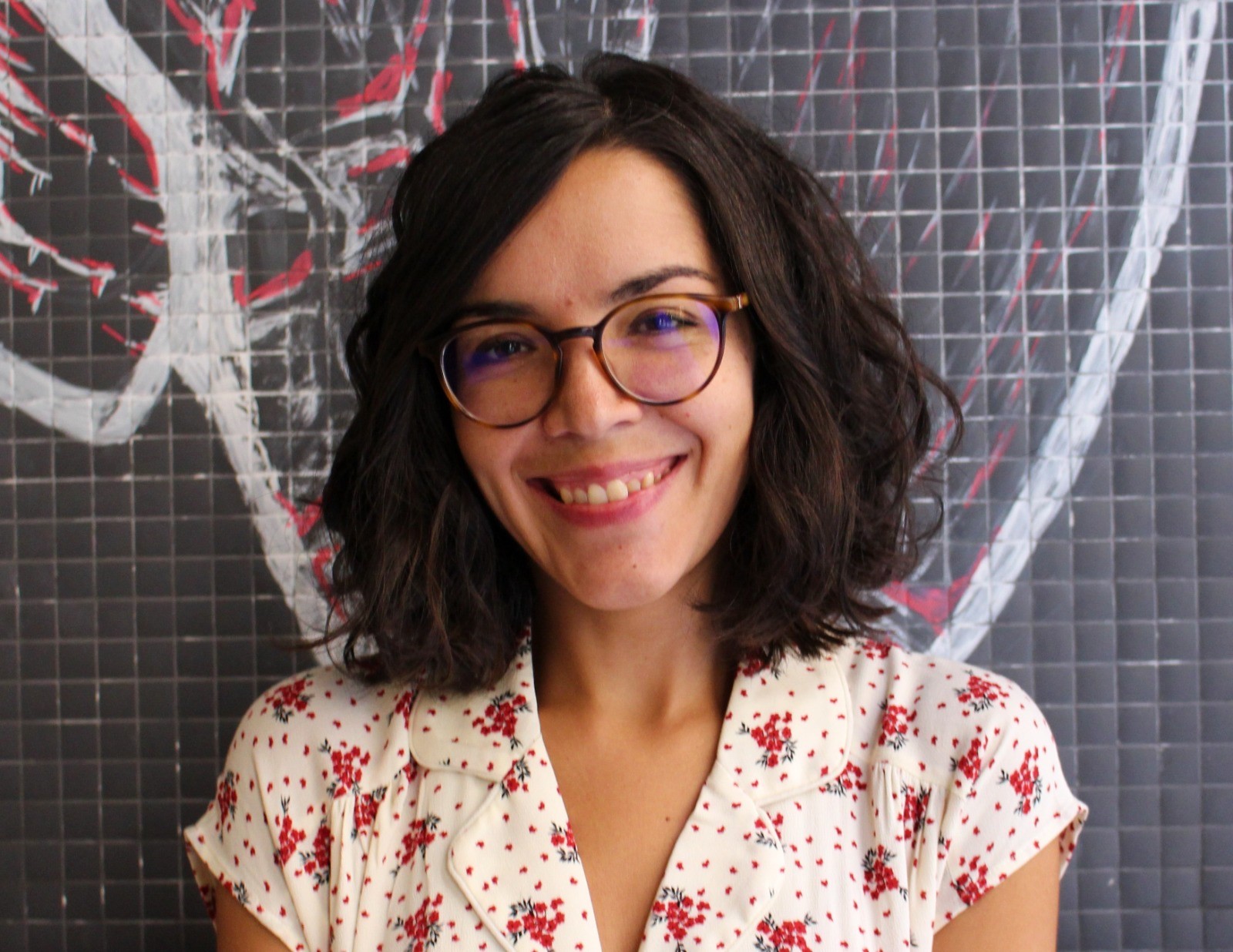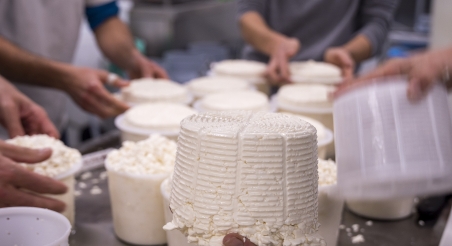Pilar Martínez (Conca, 1982) is passionate about her work, with a sense of responsibility and service that deeply nourishes all the projects she leads. And food is precisely her major theme.
An agricultural engineer and a doctor in agricultural economics, the current coordinator of sustainable food projects at the Daniel and Nina Carasso Foundation grew up in Villares del Saz, a small and tranquil village in La Mancha region, where agriculture has always been one of the main economic activities. Surrounded by almond orchards, cereals, and sunflowers, the vegetable gardens splash the landscape with touches of green and red, the colours of tomatoes and cucumbers she snacked on as a child in her friend's grandfather's plot during the long summer afternoons.
Much has changed since then, but it's raining less and less. Perhaps for this reason, her interest in promoting a transformation in the agricultural and food model we experience was strengthened. Through studies and agricultural development and water resource management projects in different countries, she became fully aware of the need to promote the transition to more sustainable systems, contributing to climate change mitigation and adaptation, protecting biodiversity, and ensuring fair conditions for producers and consumers. The practices she did eight years ago at the Daniel and Nina Carasso Foundation came to her like manna from heaven. There she continues, with a full agenda and a heart boiling with so many things she wants to do.
Pilar, as the coordinator of sustainable food projects at the Daniel and Nina Carasso Foundation, do you think that shared workshops are important to drive the transition towards more sustainable food systems? Why?
Shared workshops play a fundamental role in the transition towards sustainable food due to their ability to strengthen the sector of small agroecological producers, generating added value to production and avoiding food losses linked to the seasonality of production. In addition, they favour food innovation and the supply of products that comply with all the requirements imposed by hygiene regulations, and are an extraordinary tool to articulate marketing and improve management efficiency.
Which shared workshop strikes you as a success story, whether for its vision, its ability to promote synergies and collaborations, or its impact?
It is difficult for me to choose a single example because each of the seven projects we supported in our 2019 call for Shared Workshops has very inspiring success factors. In all of them, alliances and collaborations with other actors, public or private, are fundamental. Yes, I would like to highlight the governance model of VallaEcolid, the food innovation of S'Obrador, the vision of mutual help between producers and consumers of the Subbética Ecológica association, the integration within an agroecological transition model of Bedarbide, or the revitalization of the workshops in Carcaboso, La Vall and Lautadako. In September we will publish the eight projects selected in the "From the Field to the Pantry 2021" call, with which we continue to support shared workshops and collective distribution and logistics initiatives so that they can leap agroecological food.
How do you value collaboration between small producers? Do you think it is the key to the future for a change in the agri-food production model?
The collaboration between small producers is absolutely necessary to favour the leap in the scale of agroecological production. One of the keys to the transition towards sustainable food systems is the development of models based on collaboration, instead of competition, that allow taking advantage of synergies and improving the efficiency of all processes (production, processing, distribution, etc.). In this sense, from the Foundation we consider that the social and solidarity economy is an excellent framework for achieving a change in the food model and, ultimately, a profound social transformation.
«Collaboration between small producers is absolutely necessary to promote the scale-up of agroecological production» Pilar Martínez
What role does the Carasso Foundation play in this change of model? In addition to transforming food processing, where are you focusing your agribusiness efforts right now? What actions do you think are priorities? Which project do you think is the most innovative among all the ones you are supporting at the moment?
From the Carasso Foundation, we accompany projects with a high potential for social impact and transformation of the food system with the ultimate aim of building a more ecological, fair and inclusive society. Our actions focus on the promotion of research, as well as empirical knowledge, experimentation, evaluation and shared learning. In Spain, an example of an innovative project for its ability to strengthen collective initiatives is an IT tool developed to improve the management of the distribution and logistics of sustainable food hubs, which is coordinated by an alliance of entities formed by Germinando, CERAI, Fundación Entretantos and ISEC. Another example of an innovative project is Chef 2030, coordinated by Menjadors Ecològics, which proposes a change in the food model through the change of menus in collective catering. In addition to the networking of different chefs and collective cooks, this initiative proposes the design and development of software for the management of kitchens that will facilitate both the preparation of menus and the purchase from local producers and evaluation with indicators.
The European Union has recently presented a wide set of measures to promote agroecology in the Member States. Is this way of working the land part of your mission and commitments?
For the Daniel and Nina Carasso Foundation, sustainable food is necessarily agroecological and democratic. Agroecology is present in the different initiatives that we support, such as, for example, those framed in our "Territorialized Food Systems" call, which seeks to promote alliances between local entities and civil society organizations for the participatory development of food policies that promote the model change. Through the design and implementation of food strategies, these projects contribute to the development of different types of actions at the local level, both in the urban and rural worlds, which makes it possible to strengthen the local production sector and promote consumer access to sustainable food. Also in line with agroecology, this year we launched Terralimenta, a program to support Local Action Groups (GAL) to promote the transition towards territorialized food systems in the rural environment. This program will help the LAGs to energize the agents in their territories and design a common road map for action, to integrate the objectives of the European strategies.
«For the Daniel and Nina Carasso Foundation, sustainable food is necessarily agroecological and democratic» Pilar Martínez
In this transition towards sustainable food systems that guarantee both the availability of healthy diets and the protection of the planet's resources, should we stop eating meat? For the Carasso Foundation, what is the most sustainable food diet? How do you imagine livestock farming in the future?
From the Carasso Foundation, we promote food that cares for people and the planet. Therefore, we support sustainable and socially just production models that guarantee universal access to food. We bet on extensive livestock farming models, as these take care of the environment, generate employment and energize the rural environment. As for the sustainable diet, the answer is complex, because the different dimensions of sustainability come into play: social, environmental, economic and nutritional. In this sense, we have a lot of faith in research and its ability to find answers and identify solutions to the challenges of our society. One of the initiatives supported by the Foundation, the Alimentta think tank, brings together a group of researchers from various disciplines who are working together to define a sustainable diet in the Mediterranean context.
«We bet on extensive livestock farming models, as these take care of the environment, generate employment and energize the rural environment» Pilar Martínez
The Carasso Foundation is a private institution and is named after the son of the founders of Danone. For the change in the food model we are talking about, is there a need for greater collaboration between governments and businesses?
The Daniel and Nina Carasso Foundation is a family foundation created by Marina Nahmias in honour of her parents, Daniel Carasso, founder of Danone in France and the USA, and his wife, Nina Carasso. Completely independent of the Danone group, the Foundation develops its activities in France and Spain, where we accompany a great diversity of people and projects on the path of transition, always stimulating the connection between disciplines and approaches. Due to its transversal nature, food connects all sectors and actors of society. Therefore, a change in the food model necessarily requires the collaboration of everyone: public administration, companies, organizations, citizens, etc.
«A change in food model necessarily requires the collaboration of everyone» Pilar Martínez
Your foundation tends many bridges, but perhaps one of the most surprising is the one that unites sustainable food with citizen art. What activities do you promote in this particular field and what drives you to promote them? What role does art play in the transition of the agri-food model?
Art is also a transformative element capable of building spaces for collaboration and mutual learning. As an example, the call for Citizen Art projects "Composing knowledge to build and imagine sustainable futures" promotes the creation and/or consolidation of interdisciplinary projects that include artists, scientists and citizens and invite them to jointly address the socio-ecological challenges of the society
— Lola Mayenco —



